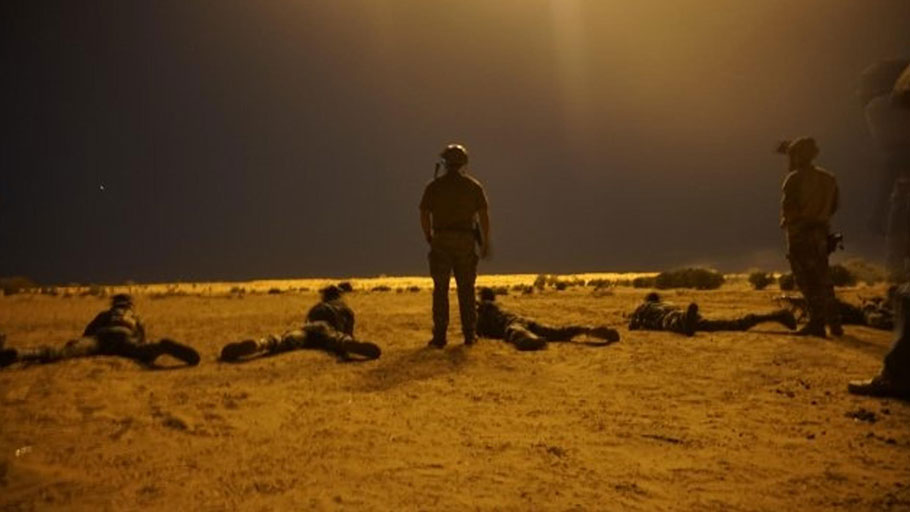In this photo released by the U.S. Army, Army Special Forces soldiers observe as Nigerien armed forces service members fire their weapons during training. (Zayid Ballesteros, Agence France-Presse via Getty Images)
That four U.S. Army soldiers lost their lives in an ambush in Niger should spark a reckoning. While U.S. news outlets flood us with reports on President Trump’s alleged insults to a widow who lost her husband and the congresswoman who defended her, and probe the tactical details of the ambush, the real question is: What are U.S. soldiers doing in combat in Niger and elsewhere across Africa? Under what authority do they operate? Is national security served by risking soldiers’ lives in what appears to be an expanding and enduring shadow war in Africa?
Sen. Lindsey O. Graham (R-S.C.), a senior member of the Senate Armed Services Committee, claimed that he had no idea there were 1,000 U.S. soldiers in Niger, but he has no qualms about the mission. But after briefings by Defense Secretary Jim Mattis, he boasted that “You’re going to see more actions in Africa, not less. You’re going to see more aggression by the United States toward our enemies, not less; you’re going to have decisions being made not in the White House but out in the field.”
The senator shamelessly flaunts Congress’s utter dereliction of its fundamental constitutional responsibility to declare war. The Founders gave Congress that power because they were worried about the executive’s penchant for wars that ended up impoverishing the people. As James Madison wrote to Thomas Jefferson, “The constitution supposes, what the History of all Governments demonstrates, that the Executive is the branch of power most interested in war, & most prone to it. It has accordingly with studied care vested the question of war in the Legislature.”
Today, however, Congress is barely more useful than an appendix, its constitutional powers abandoned, its independence defiled. U.S. forces in Niger and elsewhere in Africa — as well as the Middle East and elsewhere — operate under the ridiculous claim that the Authorization for the Use of Military Force, passed immediately after the 9/11 attacks that sanctioned action against groups and nations that participated in that attack, somehow applies 16 years later to missions against organizations that didn’t even exist when those attacks took place.
Congress and the American people are woefully uninformed about much more than the 800-plus troops in Niger. The United States is escalating what William Hartung, director of the Arms and Security Project at the Center for International Policy, terms a “shadow war” on the African continent. According to Vice’s Nick Turse, U.S. troops are now conducting 3,500 exercises, programs and engagements per year on the African continent, according to the U.S. military’s top commander for Africa, Gen. Thomas Waldhauser. That, Turse notes, is “an astounding 1,900 percent increase since the command was activated less than a decade ago.”
[IMAGE]Few legislators, much less American citizens, have any notion that U.S. troops are engaged in nearly constant missions and stationed on a growing number of bases, both enduring and temporary, across the continent. Rep. Ro Khanna (D-Calif.), a fresh voice on the House Armed Services Committee, says that we have combat troops in action in 17 countries without congressional debate.
These expanding conflicts are, of course, in addition to the wars in Afghanistan (now entering its 17th year), Iraq, Syria, Yemen and elsewhere. U.S. intervention has helped to destabilize that region and likely has generated far more terrorists than it has deterred or killed. Are we now committing to endless wars without victory across Africa?
If so the risks are clear. The United States will be drawn ever more deeply into local and regional conflicts. The reaction will fuel terrorist recruitment. The money flowing in would likely feed corruption, as it has in the Middle East. Strengthened military and security forces can overwhelm vulnerable civilian governments. Already, U.S.-trained officers overthrew Mali’s elected government in 2012 and seized power in Burkina Faso in 2014. In country after country, the United States will be blamed for acting or for not acting. This is a recipe for wars that never produce victory and never end.
This week, the Senate Foreign Relations Committee began hearings on whether the Senate should “update” the AUMF or exercise its discarded war powers. Democratic Sen. Tim Kaine (Va.) and Republican Sen. Jeff Flake (Ariz.), not exactly favorites of the Trump White House, have introduced a new war powers resolution that would authorize military force against the Islamic State (just as they are almost completely routed) with a three-year limit. Most members of Congress, however, are loath to act. They are both fearful of putting restrictions on the military and reluctant to write yet another blank check to the executive in a metastasizing war on terrorism.
We need legislators willing to assume the responsibility that the Constitution assigns them. We need in-depth hearings on the war on terrorism, hearings that probe our purpose and strategy, and measure the consequences — intended and unintended. Are we prepared to ignore our own Constitution and shred international law, claiming the right to attack anywhere at will? And if so, how do we avoid the blowback that is likely to be far more dangerous than the terrorist bands we are chasing?
Terrorism is designed to terrorize. The 9/11 attacks reduced a terrorized Congress into surrendering its powers. In the resulting vacuum, our national security state has claimed a charter for intervention across the globe. That intervention has destabilized a swath of the world from Afghanistan to Libya. And now we’re turning up the heat on Africa. Surely we need a sober reassessment before we end up reaping what we sow.















